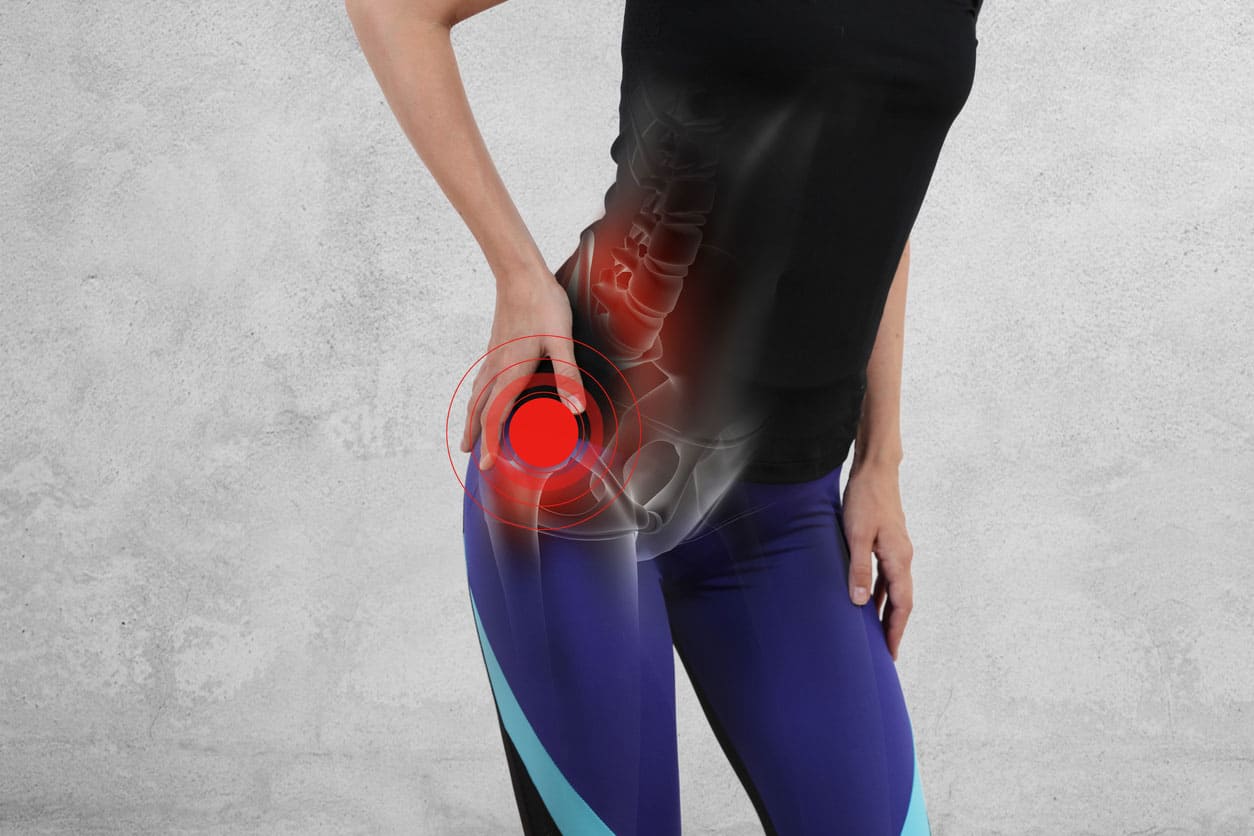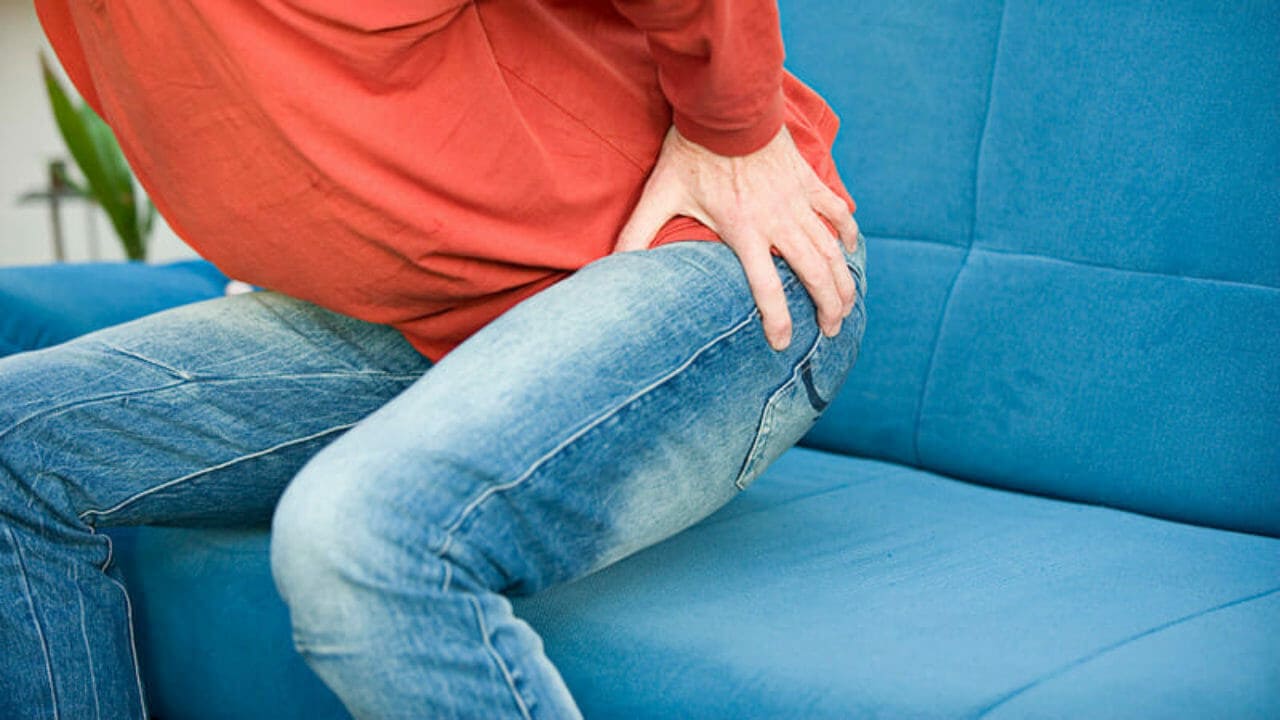What is hip pain?
03
July
2021

The hip is known to be one of the most durable parts of the human body, but that does not make it not prone to damage or injuries. In the end, it is just a cushion of cartilage that stops any friction between the hip bones. Age and excessive usage wear this cartilage down and damages it, which leads to more falling and hip injury, which in itself leads to hip pain.
Hip pain is really common and could occur because of a variety of reasons. Uncovering the exact location of the hip pain leads to uncovering the cause behind it. It mainly depends on whether the pain is felt on the inside of the hip or on its outside, as causes and treatments radically differ based on the precise location of the pain.
What causes hip pain?
As mentioned before, the most important thing is knowing where the hip hurts in particular. Many causes might lead to hip pain:
-
Inflamed tendons:
Even though leading a healthy lifestyle and exercising on a daily basis is very important for the human body, sometimes too much exercise could lead to hip pain. This condition is called inflamed tendons and it is very painful but heals quickly. It is the most common cause of hip pain.
-
Arthritis:
This type of hip pain does not heal quickly, on the contrary it is a long-term hip pain, and it is painful, stiff, and causes difficulty walking. Many types of arthritis exist from osteoarthritis (OA), which results of old age, to traumatic arthritis that is caused by a trauma to a join, to infectious arthritis when the cartilage gets infected, and finally to rheumatoid arthritis (RA) that occurs when the body’s immune system attacks the joints and leads to the destruction of the cartilage.
-
Trochanteric bursitis:
This condition is more common for women. It occurs when the bursa, which is the sac near the hip joint and is filled with liquid, gets infected. It can happen either because of a hip injury or because of an overuse of the hip joints.
-
Hip fractures:
This condition is the most extreme one. It leads to a lot of pain and needs surgery and physical therapy to be corrected. It is more common in older adults and especially anyone that has weak bones or suffers from osteoporosis.
Many other less common causes might lead to hip pain even though they occur very rarely, and they include:
-
Snapping hip syndrome:
This syndrome is literally a snap of the hip bones. It is not as painful as it sounds and could even sometimes be painless. It’s a sign of a tear in the cartilage of the hip and occurs usually with athletes and professional dancers.
-
Osteonecrosis:
This cause happens when the bones of the hip are not receiving enough blood. This leads to the loss of their support, and they will eventually collapse, break, or crumble. The cause behind it is not always clear but research has shown that joint injuries, high intakes of alcohol, medications and steroids increase the possibility of suffering from it.
What are the symptoms of hip pain?
Some clear symptoms of hip pain are:
-
Piriformis syndrome:
This syndrome is a very direct symptom of hip pain. It occurs when you feel pain in the lower back while moving the leg out or back from the body. This means that the nerve going between the hip muscles is getting pinched, and when the muscle gets pulled, pain is felt.
-
Snapping hip:
As clear as its name, it’s a snapping feeling in the muscles of the hip. It happens when the person moves his leg, and a pop feeling occurs at the top of the thigh. Some people are born with this feeling, but if it’s happening recently and suddenly, a doctor’s check-up might be best.
-
Stress fracture of the femoral neck:
The femoral neck is the part of the thigh bone that moves in the socket of the pelvis. When a dull ache is felt in this area that just gets worse and worse each time, it’s the stress fracture of the femoral neck. Most people think it is because of exercise and once they take a break from exercising it will heal, but it’s not the case. This case occurs because of two main reasons, either a fall or a repetitive injury on the hips because of a certain exercise or sport.
-
Trochanteric bursitis:
This type of pain does not happen on the inside part of the hip, but on the contrary it’s a feeling of pain on the outside part of the hip and the upper thigh. It occurs when the fluid filled sac next to the femoral neck, called the bursae, gets infected. This is why, while going to get checked up, it is very important to know exactly the place of the pain on your hips so that the medical help can give you a correct diagnosis and treatment.

When does hip pain become serious?
Hip pain could be either minor or severe. But in all cases, if the pain lasts for more than a couple of days, a healthcare provider’s help might be best in order to treat the condition early and without facing complications.
When is it a severe case?
A hip pain becomes severe if it is swelling, or if it has become more tender, sore, warm or red. In any of these cases prompt medical attention is needed. And of course in the case of severe pain, bleeding, or a continuing popping noise, you must not even hesitate to go to the closest medical facility because these could be signs of septic arthritis or a joint infection which can be really dangerous if left untreated.
How to diagnose hip pain?
For a doctor to be able to fully diagnose a patient with hip pain, they will need to ask a series of questions and do a series of tests. The questions might vary between asking to rate the pain level, at what time of the day it hurts the most, if the pain is affecting the ability to walk, and asking where the precise location of the pain is. Some tests might be needed like X-rays, CT scans, MRI scans and ultrasounds to have a detailed view of the bones and cartilages of the hips. Walking a bit in front of the doctor might also help so that they can judge the normality of the hip movements.
How to treat hip pain?
Rest is the best solution:
Each hip pain is different based on the cause, but if the pain is exercise related, the only way to heal it is by resting it for a few days.
Medication intake is not a bad idea:
If the pain is not exercise related – like for example if the patient suffers from arthritis – the only way to heal is through prescribed medications. It will relieve the pain and might need physical therapy that would accelerate the healing process.
Surgery is the last option:
When rest, medications and physical therapy does not work, one must undergo surgery. This case happens mostly when there is a hip fracture or a malformation that needs surgery to repair the hip or replace it completely by putting an artificial one. Surgery always needs physical therapy after it to let the patient adjust to their new hip, but it is very common and is often successful.
Alternative therapies are an option:
Alternative therapies are a type of holistic therapies that relieve the patient of his pain. But discussing this option with a doctor is very important not to make the pain worse. It includes acupuncture where very small needles will be helping the nerves of the hip heel and ease the pain.
Low-impact exercise could be very helpful:
Exercising is always important but sometimes it may lead to more hip pain, meaning that the person must start with low-impact exercises at first and have professional help. Swimming, water exercises, walking, tai chi, and yoga are the most popular low-impact exercises that have proven to help with treating and even preventing hip pain. Avoiding long sitting hours also helps your hip stay on the move and helps it heal.
Stretching is a must:
Stretching your hips, in addition to exercising, might help with hip pain. It can be done during the day or at night if the pain is keeping you up. After exercising, shower in warm water to help the muscles stretch. Work on your balance, reach to touch your toes and apply cold packs to the hips to decrease any swelling and severe pain.
All these tips are of huge help and directly contribute to an immediate relief of the pain, depending on the situation and severity of the case, but seeking a doctor’s help is always the best way to fix this problem, as they are the ones to give the appropriate treatments and prevention methods.
If you or anyone you know is suffering from severe pain in your hips, call us today on (469) 562 4188 to book an appointment with our specialists.